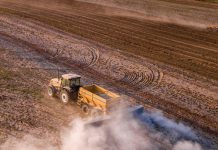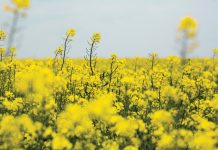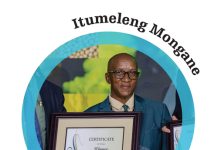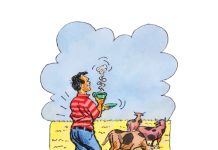 Although Gardner Khulekani Khumalo (37) had the knowledge of three generations to guide him in his farming operation, he could not have imagined what the guidance of a Grain SA mentor would bring about. With a yield of 8,01 t/ha, Gardner became the first winner in the small-scale maize farmer category of Grain SA’s 2020 Grow for Gold National Yield Competition. To him Grain SA’s remarkable farmer development programme and the guidance of mentor, Chris de Jager, were instrumental in his success.
Although Gardner Khulekani Khumalo (37) had the knowledge of three generations to guide him in his farming operation, he could not have imagined what the guidance of a Grain SA mentor would bring about. With a yield of 8,01 t/ha, Gardner became the first winner in the small-scale maize farmer category of Grain SA’s 2020 Grow for Gold National Yield Competition. To him Grain SA’s remarkable farmer development programme and the guidance of mentor, Chris de Jager, were instrumental in his success.
Small changes, big results
Chris was appointed as Gardner’s mentor two seasons ago. ‘He is a wonderful teacher,’ Gardner says. ‘A lot of what we were doing on the farm before Chris came on board would probably not be considered as good agricultural practices.’
Apart from personal farm visits from Chris, Gardner also attended the study group sessions regularly to increase his agricultural knowledge. He says having a mentor played a huge part in his success as did the input from wonderful neighbouring commercial producers in the area.
The Khumalos took on board the information shared by their mentor – from the importance of water conservation and preserving the soil quality for the future to technology.
Gardner says they were not keen on soil sampling until they witnessed the difference it makes. Now it is one practice they are taking very seriously. ‘After our harvest the previous season, we took soil samples. When the results came back, we immediately made the necessary applications according to the results. This way we know we can look forward to a good yield.’
A strict and effective spraying programme is also followed on the farm and they ensure that no mistakes are made when applying fertiliser.
According to Gardner, success in farming is not about hard work or luck, but a combination of good agricultural practices, a good cultivar and the right amount of rain. At the time of the interview early in January the rain was delaying their planting, causing Gardner to say: ‘Good rain can’t be overlooked, but it is more than enough now.’
Advice from a winner
Gardner happily shares some tips with other small-scale farmers who would also like to improve their yield:
- To have a good yield, you need to know your soil. If you don’t know your soil, you will waste money on things the soil does not need. Soil sampling ensures you only buy what is needed.
- Follow a strict spraying programme to ensure a healthy crop and to prevent yield loss.
- Stick to the correct planting date.
- Finally, it is important to buy certified seed. This way good advice from a knowledgeable source – the seed company representative – usually comes with the purchase.
For Gardner, this ‘source’ was Sandile Khumalo, a representative from DEKALB. He ensured that the Khumalos bought the best seed for their soil, the cultivar DKC 68-58BR. Sandile also entered Gardner into the yield competition.
Born and raised a farmer
Gardner started farming at a very young age, following in the footsteps of his father, grandfather and great-grandfather who were all farmers. ‘I really was born a farmer,’ he says.
As soon as he and Sphephelo, his twin brother, learned how to drive, they started helping on the farm. ‘When I was in grade 11, we started growing vegetables on a 7-ha piece of land at my grandmother’s place.’
After completing his school career, he decided to enrol for a course in animal production, which he did not complete as his passion for farming called him to the farm.
As the years passed, the twins and their father realised that they had to grow their enterprise if they wanted to make a difference. To contribute to food security in South Africa they needed more land. As they were already the proud owners of some equipment and tractors, they applied for a loan at Ithala Bank in 2011 and purchased a 672-ha farm, Liesbethdale at Madadeni in the Amajuba district on the outskirts of Newcastle. From here Mgodeni Farming Primary Cooperative started producing maize and soybeans in 2012 on 285 ha of arable land. The rest of their farm is utilised as grazing for the 96 head of cattle.
‘We tried our hand at planting potatoes on 15 ha between 2012 and 2014, but unfortunately it was not a profitable venture, so we decided to focus on maize and soybeans.’
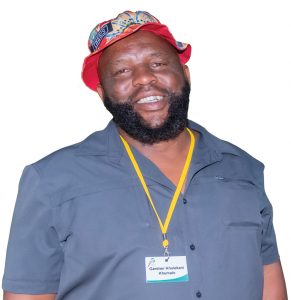 For the future, this fourth-generation farmer is dreaming of expanding the family’s farming operation. ‘I hope to eventually have 1 000 ha of arable land to plant. 285 ha is a bit too small to make serious money!’ he adds with a smile.
For the future, this fourth-generation farmer is dreaming of expanding the family’s farming operation. ‘I hope to eventually have 1 000 ha of arable land to plant. 285 ha is a bit too small to make serious money!’ he adds with a smile.
Gardner has no plan to change his career and trusts that the South African government will turn their focus to food security in the future and move away from the idea of land redistribution without compensation. ‘This makes me a bit afraid of the future, as it will not only harm agriculture, but food security as well.’
He loves target shooting and enjoys watching soccer. However, when the farming activities have quietened down, you will find Gardner at one of the three dams on the farm with a fishing rod in his hands – where he can relax and plan for the next successful season.





